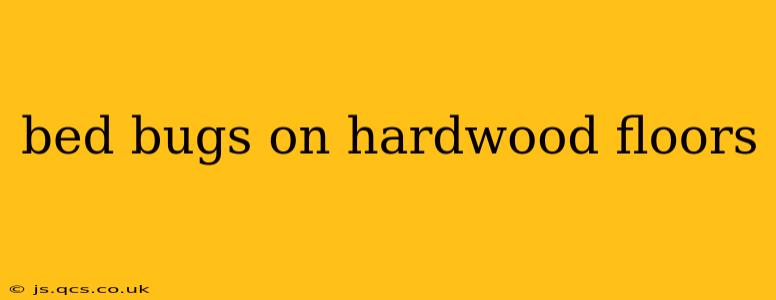Bed bugs are tiny, parasitic insects that feed on human blood, causing itchy welts and sleepless nights. While often associated with mattresses and bedding, they can infest any area of your home, including hardwood floors. This comprehensive guide explores how bed bugs can live on hardwood floors, how to detect them, and what effective treatment methods exist.
Can Bed Bugs Live on Hardwood Floors?
Yes, bed bugs can absolutely live on hardwood floors. While they prefer to reside near their food source (humans), hardwood floors provide a suitable hiding place during the day. Cracks, gaps, and crevices in the flooring, as well as the space between the floor and baseboards, offer excellent shelter. They can also hide beneath loose floorboards or in areas where the flooring meets walls.
How Do Bed Bugs Get on Hardwood Floors?
Bed bugs are incredibly adept at finding their way into homes. They can be introduced through:
- Used furniture: Buying secondhand furniture, especially mattresses, box springs, and upholstered pieces, can bring bed bugs into your home.
- Luggage: Travelers can unknowingly bring bed bugs back from hotels or other infested locations.
- Clothing: Infested clothing can transfer bed bugs to your home.
- Neighboring units: Bed bugs can easily travel between apartments or houses through cracks in walls or shared spaces.
How to Detect Bed Bugs on Hardwood Floors?
Detecting bed bugs on hardwood floors requires a keen eye and careful inspection. Look for:
- Live bed bugs: These are small, flat insects, typically reddish-brown, about the size of an apple seed.
- Bed bug fecal spots: These appear as tiny, dark specks resembling pepper.
- Bed bug eggs: These are small, pearly white and difficult to see without magnification.
- Bed bug shed skins: As bed bugs grow, they shed their skin, leaving behind evidence of their presence.
What are the Signs of a Bed Bug Infestation?
Beyond visually spotting bed bugs on the floor, be aware of these signs of infestation:
- Itchy bites: Red, itchy welts, often in a line or cluster.
- Blood stains on bedding: This indicates bed bugs have fed.
- A musty odor: Large infestations can produce a distinctive, unpleasant odor.
How to Get Rid of Bed Bugs on Hardwood Floors?
Eradicating bed bugs requires a multi-pronged approach:
- Thorough cleaning: Vacuuming cracks and crevices in the floor is essential to remove bed bugs, eggs, and fecal matter. Dispose of the vacuum bag immediately afterward.
- Professional pest control: Professional exterminators have specialized tools and treatments to effectively eliminate bed bugs, including hardwood floor treatments. They might use insecticides or heat treatments.
- Encasement: Mattress and box spring encasements prevent bed bugs from entering and breeding.
Do Hardwood Floors Prevent Bed Bugs?
While hardwood floors don't prevent bed bugs completely, they can make detection and treatment easier than carpeted floors. The lack of fabric and crevices makes it simpler to inspect and clean. However, the gaps and cracks within the flooring itself can still harbor bed bugs.
Are Hardwood Floors Easier to Clean Than Carpets for Bed Bugs?
Yes, hardwood floors are generally easier to clean than carpets when dealing with bed bugs. The smooth surface allows for easier vacuuming and prevents bed bugs from hiding as readily in the fibers as they would in carpet.
Can Bed Bugs Live in Hardwood Floor Cracks?
Absolutely. Cracks and crevices in hardwood floors, along with the space between the flooring and baseboards, provide ideal hiding places for bed bugs. These protected areas shield them from cleaning efforts and pesticides.
How Effective is Vacuuming in Removing Bed Bugs From Hardwood Floors?
Vacuuming is a crucial step in bed bug control on hardwood floors, helping remove live bugs, eggs, and fecal matter. However, it’s not a complete solution and should be combined with other methods like professional treatment.
This detailed guide provides a comprehensive understanding of how bed bugs interact with hardwood floors. Remember that early detection and professional help are key to successfully eliminating a bed bug infestation. Don't hesitate to seek professional assistance if you suspect an infestation.
